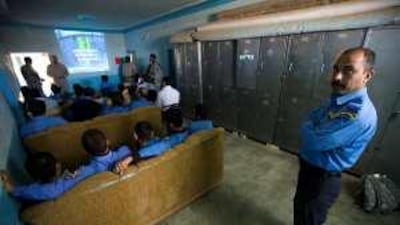Kirkuk, Iraq // On a fortified base in Bushariyah, a few kilometres south of Kirkuk, 19 Iraqi police officers sat on cramped old sofas, watching a PowerPoint slide show about human rights. Two US police officers sent to Kirkuk as part of a training programme stood at the front of the room, explaining that torture was against international and Iraqi laws, and was not acceptable under any circumstances.
The taller of the two trainers, a Southerner with a shaved head and goatee, and a pistol holstered on his thigh, asked the Iraqis what they would do if they saw one of their colleagues torturing a prisoner. "Well, he wouldn't be torturing them for no reason so it depends why he's doing it," said Sabah Akbar, a police officer sitting in the front row. He appeared to have given the matter some thought. "If I was beating a prisoner, it's because I have a reason. Perhaps I have information that he is a terrorist."
His tutor, showing a grim insight into the realities of modern Iraq, where prisoner abuse remains widespread, suggested the correct course of action would be to go and get help and then try to stop any torture. "If you walk in there alone and try to stop some guys beating a prisoner, they might end up beating you," he said. "That's not what you need. Go and get help, and then go and try to stop it, that's the right thing to do."
The electricity supply to the Iraqi police station, where the classes were taking place, then cut out, darkening the projection screen. Some of the officers duly wandered outside, took the battery out of one of their patrol jeeps and used it to start their own generator. With the power back on, the presentation continued. A slide flashed up that explained evidence gained under torture was likely to be thrown out of court, and that any criminal case built on forced confessions would collapse.
"Every suspect complains that we tortured them when they get to see a judge," Mr Akbar said. "Even if we didn't beat them, they'll say we did, so what's the difference?" The trainers changed tack, telling their audience that abused prisoners will admit to anything to stop the pain, even if they are innocent. That line of reasoning must have had a special resonance in a country that has known Saddam Hussein's torture chambers and the US's own torturers at Abu Ghraib. The Iraqi police officers quietly nodded their agreement.
The lesson then moved on to how to stop and search suspects at checkpoints without violating human rights. Mr Akbar again spoke up. "The trouble is there is a kind of racism here, as you have between the whites and the blacks in America," he said. "We can't stop certain people at checkpoints, they won't listen to us. And we can't stop some people from torturing, if they are higher ranking or from certain groups with connections."
He gave an example of what he meant. Weeks before, an officer from the station had been called to help seal off a bomb scene. An important tribal leader decided that he wanted to pass through the closed road and the officer would not let him. Angry words were exchanged and, a few days later, the police officer was put in prison. The tribal sheikh had apparently used connections inside the Kirkuk police department to have the officer detained for failing to respect his authority.
All of the police in the Bushariyah station are Shiite Turkoman, a minority that has suffered in Iraq, now hyperaware to sects and ethnicities. Iraqi police officials insist there is no discrimination inside the force, but, in reality, Kirkuk is a highly politicised province and, even according to the relatively impartial US military, those politics cross over into everyday policing. The human rights lesson in Bushariyah continued - stopping only for another power cut - as Iraqi police watched more slides flash past.
At the end, the US trainers underlined their message, again showing a grim insight into the realities of a country in which violence is never far away. "If someone from your family is killed by a bomb, and you catch the guy who did it, what do you do?" the shorter trainer asked. Again it was Mr Akbar who answered. "If you catch him, you're going to want to punish him, but you have to control yourself," he said. "We may not want to follow the rules, but we have to follow them."
Before the lesson closed, Mr Akbar said he had a human rights question of his own. "Before, we didn't have any of this democracy or freedom or rights," he said. "You Americans have had these things for a long time. Why is it if an American convoy hits a bomb, you see them starting to shoot everywhere, they are just shooting for no reason and innocent people are killed? That's a problem for coalition forces."
The US army lieutenant in charge of the mission, Sean Grevious, said such behaviour was unacceptable. "We all have to follow the rules," he said. "Shooting like that is not something I would allow my soldiers to do. We should all be making sure we stick to the rules, the Iraqi police, the Iraqi army, the American army. We must follow the law." Lt Grevious and the police trainers then left Bushariyah, passing by the photos of at least half a dozen Iraqi officers from the same station who had been killed in the line of duty.
psands@thenational.ae

